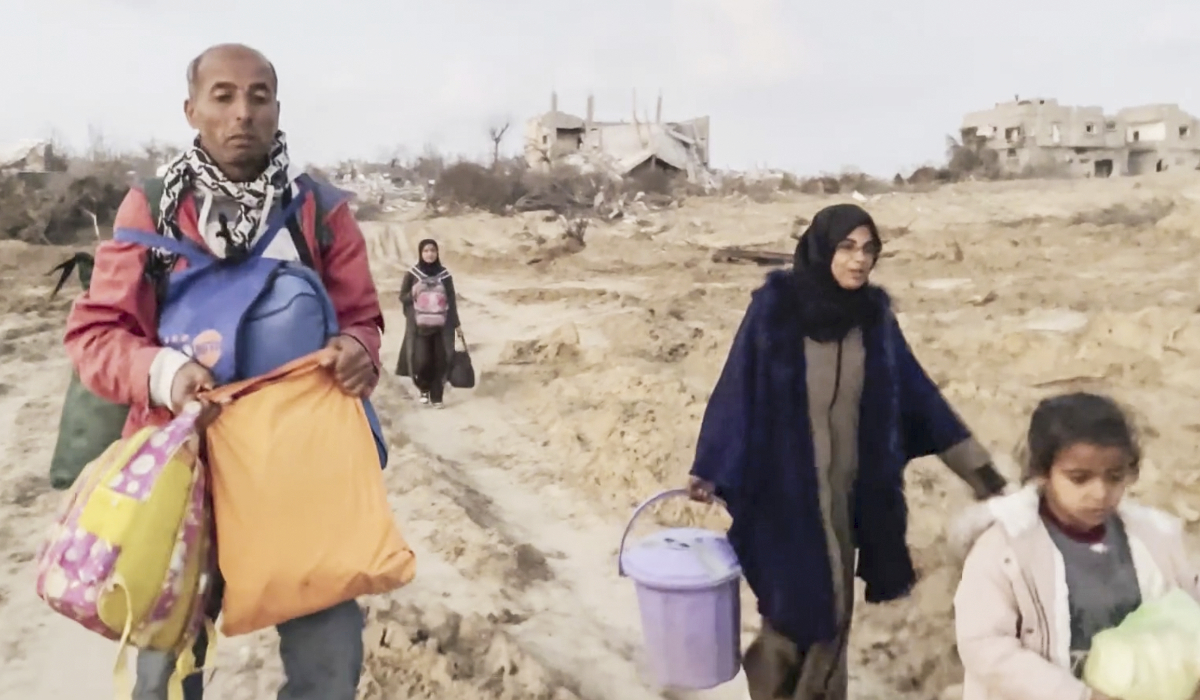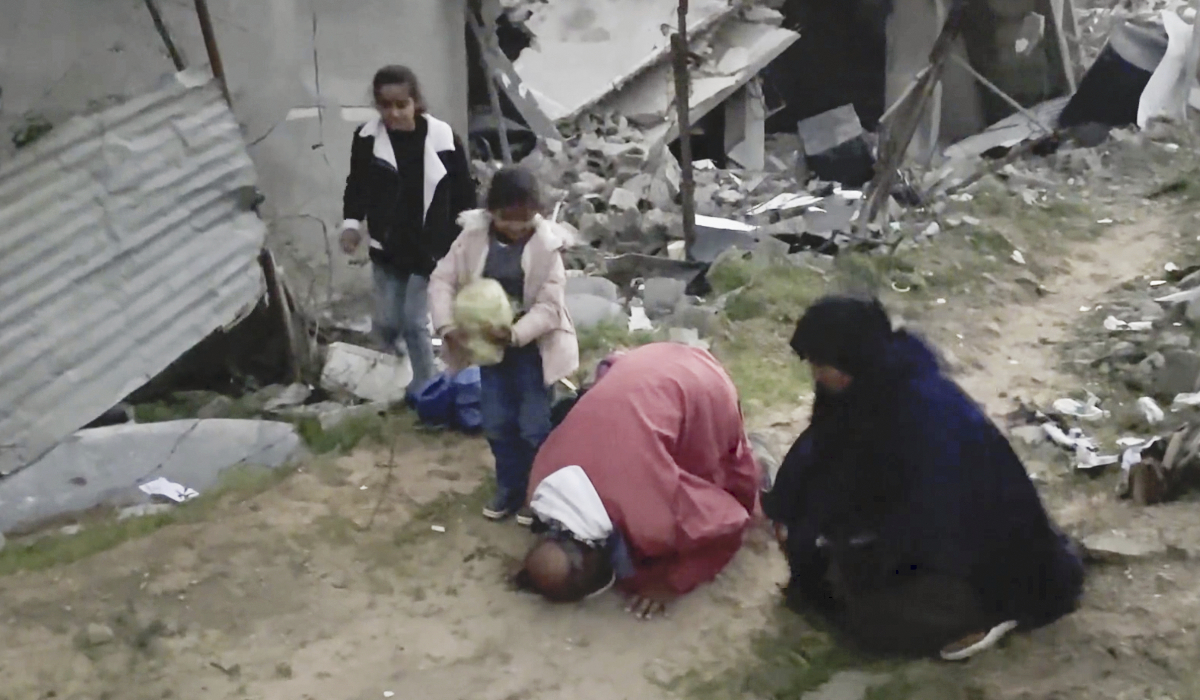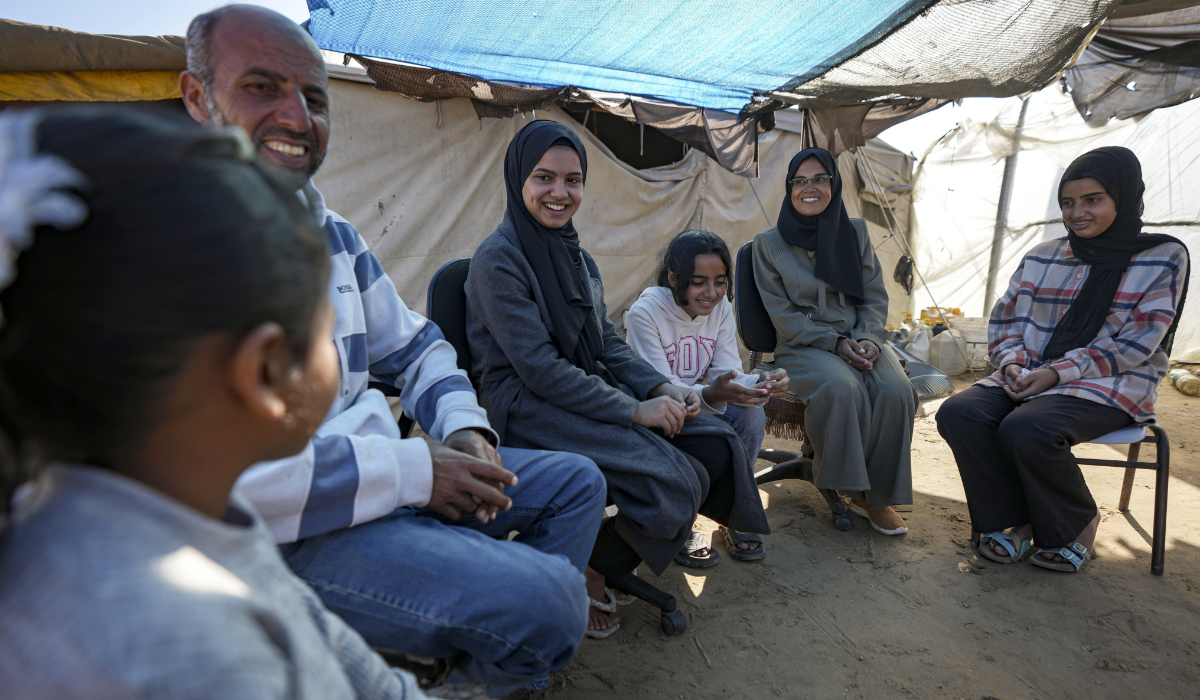CAIRO: A rights lawyer who hopes to run in Egypt’s presidential election in March said Wednesday that bureaucrats loyal to the government were obstructing efforts to get him on the ballot, while his campaign officials said police and government supporters were intimidating potential voters.
The complaints, aired at a news conference held at Khaled Ali’s campaign headquarters in downtown Cairo, suggested that he was struggling to secure the 25,000 signatures, or “recommendations,” necessary to challenge President Abdel-Fattah el-Sisi, who is widely expected to run for and win a second four-year term.
Alternatively, a presidential hopeful could secure the formal backing of 20 elected lawmakers. But the overwhelming majority of the chamber’s 596 members already have pledged their support to el-Sisi, who has yet to formally announce his candidacy.
“The battle for the recommendations is the real battle in this election. Either we win together or I fail alone.” Ali told reporters.
Ali has until Jan. 29 to submit the certified signatures. He said he wanted to submit them on Jan. 25, the seventh anniversary of the popular uprising that toppled longtime autocrat Hosni Mubarak. El-Sisi’s supporters portray the uprising as a foreign conspiracy aimed at destabilizing the country.
Malek Adly, a rights lawyer and another January “revolutionary” from Ali’s campaign, told the news conference that supporters were “taking a risk” by visiting government offices to certify their signatures. He also criticized the personal attacks waged against Ali by pro-government talk show hosts.
“The legal team will start legal proceedings against every one of them,” he pledged. He said the campaign also complained about the thousands of street billboards in support of el-Sisi, saying they violate the timeline laid out by the election commission. Campaigning is supposed to begin Feb. 24 and last for under four weeks.
The vote will be held March 27-28 with runoffs, if needed, the following month.
Ali said government workers dragged their feet when his supporters asked for their signatures to be certified.
“We are fully aware of the difficulties and dangers involved in the battle to defend politics and win back public space,” he said. “This is the battle to regain our self-confidence and our ability to work together.”
Several campaign officials who spoke to The Associated Press said Ali supporters were intimidated and threatened by undercover policemen and el-Sisi supporters crowding the government offices. They expressed fears that the process of gathering and certifying signatures would allow authorities to target supporters after the vote.
They spoke on condition of anonymity because they were not authorized to discuss confidential deliberations.
Since el-Sisi led the military overthrow of an elected Islamist president in 2013, authorities have arrested thousands of people, mainly Islamists but also several prominent secular activists, including many who were behind the 2011 uprising. Street protests have been effectively banned, human rights groups placed under severe restrictions and many critics in the media have been silenced.
El-Sisi has said such measures are necessary to restore stability and rebuild the economy after years of unrest, and to combat a Daesh-led insurgency.
Ali shot to national fame when he won a court case that annulled Egypt’s transfer of two Red Sea islands to Saudi Arabia. The government went ahead anyway with the transfer after the agreement was hurriedly ratified by parliament.
He was convicted and sentenced to three months in prison in September for allegedly making an obscene gesture while celebrating the court’s ruling in January 2016. He is appealing the verdict, but if his conviction is upheld he would not be eligible to run.
Another hopeful, former Egyptian lawmaker Mohammed Anwar Sadat, said this week he won’t run, arguing that the political “climate” was not conducive to campaigning. The nephew of Egypt’s late leader Anwar Sadat told reporters Monday that his decision was partially taken to protect his campaign workers from intimidation or arrest.
Last week, former prime minister and air force general Ahmed Shafiq also pulled out of the race, saying he was not the “ideal” person to lead the country at this stage. His decision followed a flood of harsh criticism, some personal, by the pro-government media. Shafiq, who finished second in the 2012 elections, could have potentially lit up the race.
The withdrawals have led many to wonder whether el-Sisi would end up as the only name on the ballot. For decades, Egypt’s presidents were elected in rigged, one-name referendums.
El-Sisi has urged Egyptians to come out and vote, suggesting he is looking for a high turnout that would lend credibility and legitimacy to his widely expected win. That the vote is staggered over three days appears designed to serve that objective.
Egypt presidential hopeful says bureaucrats blocking his bid
Egypt presidential hopeful says bureaucrats blocking his bid

This is what one family in Gaza returned home to after 15 months of war

- Since Monday, more than 375,000 Palestinians have made their way back to northern Gaza, many of them on foot
- Over 15 months, Israel launched repeated offensives in Gaza City and surrounding areas, trying to crush Hamas fighters who often operated in densely populated neighborhoods
BEIT LAHIYA, Gaza Strip: The grove of orange, olive and palm trees that once stood in front of Ne’man Abu Jarad’s house was bulldozed away. The roses and jasmine flowers on the roof and in the garden, which he lovingly watered so his family could enjoy their fragrance, were also gone.
The house itself was a damaged, hollowed-out shell. But after 15 months of brutal war, it stood.
At the sight of it Monday, Ne’man; his wife, Majida; and three of their six daughters dropped the bags they had been lugging since dawn, fell to their knees and prayed, whispering, “Praise be to God, praise be to God.” The sunset blazed orange in the sky above.

After 477 days of hell — fleeing the length of the Gaza Strip, hiding from bombardment, sweltering in tents, scrounging for food and water, losing their possessions – they had finally returned home.
“Our joy is unmatched by any other, not the joy of success, of a marriage or of a birth,” Majida said. “This is a joy that can’t be described in words, in writing or in any expression.”
In October, at the one-year anniversary of the Gaza war, The Associated Press traced the Abu Jarad family’s flight around the territory seeking safety. They were eight of the roughly 1.8 million Palestinians driven from their homes by Israel’s massive campaign of retaliation against Hamas following the militants’ Oct. 7, 2023, attack on southern Israel.

Like many families, they were displaced multiple times. Ne’man, Majida and their daughters – the youngest in first grade, the oldest in her early 20s – fled their home at the northernmost part of Gaza hours after Israeli bombardment began. They would move seven times in total, fleeing all the way to Gaza’s southernmost city Rafah.
Each time, their conditions worsened. By October 2024, they were languishing in a sprawling tent camp near the southern city of Khan Younis, exhausted and depressed, with little hope of seeing home again.
Hope suddenly revived when Israel and Hamas reached a long-awaited ceasefire earlier this month. On Jan. 19, the first day of the truce, Majida began packing up their clothes, food and other belongings. On Sunday, the announcement came: The next day, Israeli troops would pull back from two main roads, allowing Palestinians to return to the north.

Since Monday, more than 375,000 Palestinians have made their way back to northern Gaza, many of them on foot.
The Abu Jarads set off Monday from their tent at 5 a.m., loading bags stuffed with their belongings into a car. The driver took them to the edge of the Netzarim Corridor, the swath of land across Gaza that Israeli forces had turned into a military zone that – until this week – had barred any returns north.
There, they got out and walked, joining the massive crowds making their way down the coastal road. For around 8 kilometers (5 miles), the 49-year-old Ne’eman carried one sack on his back, held another in his arms, and two bags dangled from the crooks of his elbows. They stopped frequently, to rest, rearrange bags, and drop items along the way.
“The road is really hard,” Majida told an AP journalist who accompanied them on the journey. “But our joy for the return makes us forget we’re tired. Every meter we walk, our joy gives us strength to continue.”
Reaching the southern outskirts of Gaza City, they hired a van. But it quickly ran out of fuel, and they waited more than an hour before they found another one. Driving through the city, they got their first look at the war’s devastating impact in the north.
Over 15 months, Israel launched repeated offensives in Gaza City and surrounding areas, trying to crush Hamas fighters who often operated in densely populated neighborhoods. After each assault, militants would regroup, and a new assault would follow.
The van made its way down city streets strewn with rubble, lined with buildings that were damaged husks or had been reduced to piles of concrete.
“They destroyed even more in this area,” Ne’man said, staring out the window as they left Gaza City and entered the towns of Beit Lahiya and Beit Hanoun – scene of one of Israel’s most ferocious offensives in the last three months before the ceasefire.
As the sun began to set, the van dropped them off at the edge of their neighborhood. Ne’man’s daughters stood in shock. One gaped, her hands on her cheeks. Her sister pointed out at the field of flattened houses. They walked the last few hundred meters, over a landscape of rutted, bulldozed dirt.
Trudging as fast as he could under the bags draping from his body, Ne’man — a taxi driver before the war — repeated over and over in excitement, “God is great, God is great. To God is all thanks.”
Their home still stood, sort of — a hollow shell in a row of damaged buildings. After they prayed in front of it, Ne’eman leaned on the bare concrete wall of his house and kissed it. To his joy he discovered that one flowering vine in front of the house had miraculously survived. He immediately set about examining and arranging its tendrils.
One of the girls dashed in through the now doorless front entrance. “Oh Lord, oh Lord,” her gasps came from the darkness inside. Then she began to cry, as if all the shock, sorrow, happiness and relief were gushing out of her.
Like others streaming back into northern Gaza, the Abu Jarads will face the question of how to survive in the ruins of cities decimated by war. Water and food remain scarce, leaving the population still reliant on humanitarian aid, which is being ramped up under the ceasefire. There is no electricity. Tens of thousands are homeless.
Adjoining the Abu Jarads’ home, Ne’man’s brother’s three-story house is now a pile of concrete wreckage after it was destroyed by an airstrike. It damaged Ne’man’s home as it collapsed, “but, thank God, there is an undamaged room which we will live in,” he said. He vows to repair what is damaged.
Grief from the war lays heavily on him, Ne’man said. His uncle lost his home, and several of his uncle’s children were killed. Several of his neighbors’ homes were destroyed. Ne’man said he will have to walk several kilometers (miles) to find water, just like he did in the displacement camps.
“Once again, we will live through suffering and fatigue.”
Russia, Syria to hold further talks on Russian military bases in Syria, TASS reports

DAMASCUS: Russia and Syria will hold further talks regarding Russian military bases in Syria, Russia’s news agencies reported late on Tuesday, citing Russian Deputy Foreign Minister Mikhail Bogdanov as telling journalists after his talks with Syrian officials.
“This issue requires additional negotiations,” TASS news agency cited Bogdanov as saying. Bogdanov is heading Russia’s delegation to Damascus for the first time since Moscow’s ally President Bashar Assad was toppled.
He added that so far there have been no changes to the presence of Russian military bases in the country.
New backlash over Trump plan to move people out of Gaza

- “We emphasize that Jordan’s national security dictates that the Palestinians must remain on their land and that the Palestinian people must not be subjected to any kind of forced displacement whatsoever,” Jordanian’s spokesman Mohammad Momani said
- Israel has killed at least 47,317 people in Gaza, the majority civilians according to figures from the Hamas-run territory’s health ministry that the UN considers reliable
JERUSALEM: An idea floated by US President Donald Trump to move Gazans to Egypt or Jordan faced a renewed backlash Tuesday as hundreds of thousands of Gazans displaced by the Israel-Hamas war returned to their devastated neighborhoods.
A fragile ceasefire and hostage release deal took effect earlier this month, intended to end more than 15 months of war that began with Hamas’s October 7, 2023 attack on Israel.
After the ceasefire came into force, Trump touted a plan to “clean out” the Gaza Strip, reiterating the idea on Monday as he called for Palestinians to move to “safer” locations such as Egypt or Jordan.
The US president, who has repeatedly claimed credit for sealing the truce deal after months of fruitless negotiations, also said he would meet Israeli Prime Minister Benjamin Netanyahu in Washington “very soon.”
Jordan, which has a tumultuous history with Palestinian movements, on Tuesday renewed its rejection of Trump’s proposal.
“We emphasize that Jordan’s national security dictates that the Palestinians must remain on their land and that the Palestinian people must not be subjected to any kind of forced displacement whatsoever,” Jordanian government spokesman Mohammad Momani said.
Qatar, which played a leading role in the truce mediation, on Tuesday said that it often did not see “eye to eye” with its allies, including the United States.
“Our position has always been clear to the necessity of the Palestinian people receiving their rights, and that the two-state solution is the only path forward,” Qatar’s foreign ministry spokesman Majed Al-Ansari said.
Following reports that Trump had spoken with Egyptian President Abdel Fattah El-Sisi at the weekend, Cairo said there had been no such phone call.
“A senior official source denied what some media outlets reported about a phone call between the Egyptian and American presidents,” Egypt’s state information service said.
On Monday, Trump reportedly said the pair had spoken, saying of El-Sisi: “I wish he would take some (Palestinians).”
After Trump first floated the idea, Egypt rejected the forced displacement of Gazans, expressing its “continued support for the steadfastness of the Palestinian people on their land.”
France, another US ally, on Tuesday said any forced displacement of Gazans would be “unacceptable.”
It would also be a “destabilization factor (for) our close allies Egypt and Jordan,” a French foreign ministry spokesman said.
Moving Gaza’s 2.4 million people could be done “temporarily or could be long term,” Trump said on Saturday.
Israel’s far-right Finance Minister Bezalel Smotrich said he was working with the prime minister “to prepare an operational plan to ensure that President Trump’s vision is realized.”
Smotrich, who opposed the ceasefire deal, did not provide any details on the purported plan.
For Palestinians, any attempts to force them from Gaza would evoke dark memories of what the Arab world calls the “Nakba,” or catastrophe — the mass displacement of Palestinians during Israel’s creation in 1948.
“We say to Trump and the whole world: we will not leave Palestine or Gaza, no matter what happens,” said displaced Gazan Rashad Al-Naji.
Almost all of the Gaza Strip’s inhabitants were displaced at least once by the war that has levelled much of the Palestinian territory.
The ceasefire hinges on the release during a first phase of 33 Israeli hostages held in Gaza in exchange for around 1,900 Palestinians held in Israeli jails.
On Monday, Israeli government spokesman David Mencer said eight of the hostages due for release in the first phase are dead.
Since the truce began on January 19, seven Israeli women have been freed, as have about 290 Palestinians held in Israeli prisons.
On Monday, after Hamas and Israel agreed over the release of six hostages this week, “more than 300,000 displaced” Gazans were able to return to the north, according to the Hamas government media office.
“I’m happy to be back at my home,” said Saif Al-Din Qazaat, who returned to northern Gaza but had to sleep in a tent next to the ruins of his destroyed house.
“I kept a fire burning all night near the kids to keep them warm... (they) slept peacefully despite the cold, but we don’t have enough blankets,” the 41-year-old told AFP.
Hamas’s October 7 attack on Israel resulted in the deaths of 1,210 people, mostly civilians, according to an AFP tally based on official Israeli figures.
During the attack, militants took into Gaza 251 hostages. Eighty-seven remain in the territory, including dozens Israel says are dead.
Israel’s retaliatory offensive has killed at least 47,317 people in Gaza, the majority civilians, according to figures from the Hamas-run territory’s health ministry that the UN considers reliable.
“In terms of the death toll, yes, we do have confidence. But let’s not forget, the official death toll given by the Ministry of Health, is deaths accounted in morgues and in hospitals, so in official facilities,” World Health Organization spokesman Christian Lindmeier said Tuesday.
“As people go back to their houses, as they will start looking for their loved ones under the rubble, this casualty figure is expected to increase,” he added.
More than 376,000 return to north Gaza since Monday: UN

- OCHA: Over 376,000 people are estimated to have returned to their places of origin in northern Gaza
- “This is our homeland and we have to go back,” said one displaced woman, Ola Saleh
UNITED NATIONS: More than 376,000 Palestinians displaced by the war between Israel and Hamas have returned to northern Gaza, the UN’s humanitarian body OCHA said Tuesday.
“Over 376,000 people are estimated to have returned to their places of origin in northern Gaza, following the withdrawal of Israeli forces from the two main roads along the Netzarim corridor” that leads into the north, OCHA said in a humanitarian update.
Opinion
This section contains relevant reference points, placed in (Opinion field)
Many Palestinians said they were happy to return, even though their homes in northern Gaza are likely damaged or destroyed. Others said the feeling was bittersweet, as nearly everyone has friends or relatives killed by Israel during the 15-month war against Hamas.
“This is our homeland and we have to go back,” said one displaced woman, Ola Saleh.
The ceasefire is aimed at ending the war and releasing dozens of hostages and hundreds of Palestinians imprisoned or detained by Israel.
Paramilitary attacks displace thousands in North Darfur

PORT SUDAN: Thousands of families fled their homes in Sudan’s North Darfur state over two days, the UN’s migration agency said on Tuesday, amid intensified attacks by paramilitary forces.
“Between 25 and 27 January 2025, an estimated 3,960 households were displaced from various villages across El-Fasher locality,” the International Organization for Migration said.
The paramilitary Rapid Support Forces — at war with the army since April 2023 — have captured every state capital in the vast western region of Darfur except for North Darfur capital El-Fasher, which they have besieged since May.
In its latest attempt to capture the city, the RSF last week issued an ultimatum demanding that army forces and their allies leave the city.
The IOM said the displacement occurred due to RSF attacks, which included reported incidents of “looting and burning of personal property.”
Army and allied forces have repeatedly repelled attacks by the paramilitary forces, who local activists said launched intense artillery shelling on residential neighborhoods in the city.
On Friday, a drone attack on the city’s only functioning hospital, which local monitors blamed on the RSF, killed 70 people, drawing condemnation from the UN.
Nearly 1.7 million people are displaced in North Darfur state alone, according to the UN, with an estimated two million experiencing extreme food insecurity and 320,000 in famine.
In the area around El-Fasher, famine has already taken hold in three displacement camps — Zamzam, Abu Shouk and Al-Salam — and is expected to expand to five more areas including the city itself by May, according to a UN-backed assessment.



















